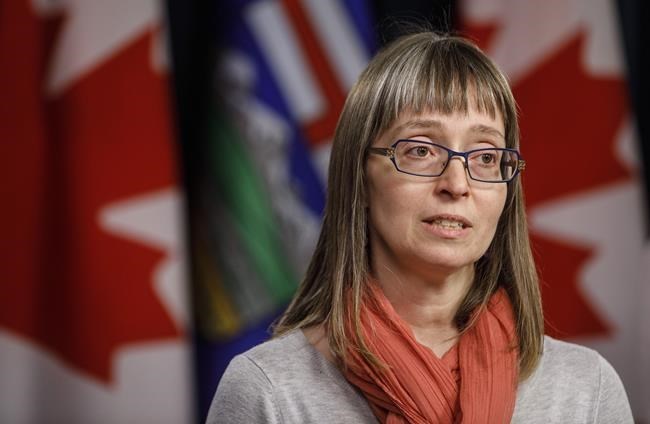EDMONTON — Alberta reported Thursday it has 68 variant cases of COVID-19, up 11 from the day before, seven of them with no known link to travel.
Dr. Deena Hinshaw, the chief medical officer of health, said two of the new cases have potentially exposed two Calgary zone schools.
Earlier possible exposures were reported in two other Calgary schools, but Hinshaw said so far there has been no spread detected in any of those classes despite enhanced testing.
Hinshaw said that higher numbers are concerning but noted, “We are currently able to test almost every single positive COVID case for variant strain, so that does help us detect more that are out there so we can contain them.”
Alberta can screen for 300 positive COVID-19 samples per day and has tested thousands of international travellers under its Border Testing Pilot Program.
“The variant cases still represent a very, very small proportion of our cases and, by finding out about them, we have the means to do something to prevent any kind of onward spread,” Hinshaw said.
The variant strains, first reported in the United Kingdom and South Africa, are exponentially more contagious than the original strain, threatening to quickly get out of control and swamp a health-care system.
Overall, Hinshaw reported 13 new deaths Thursday and 582 new cases.
There are 517 people in hospital due to COVID-19, including 93 in intensive care. The province reported 6,588 active cases.
The higher variant numbers come just days before Alberta begins a new round of loosened economic restrictions.
Starting Monday, restaurants, which have been limited to takeout and delivery, can reopen to in-person dining. One-on-one fitness appointments can also resume.
Retails stores are at 15 per cent customer capacity and entertainment venues, such as casinos and bingo halls and movie theatres, remain closed.
Indoor gatherings are banned and outdoor gatherings are capped at 10 people.
Monday’s opening is the first of a new four-stage reopening plan tied primarily to hospitalization numbers.
Premier Jason Kenney has said more of the economy will open up as the numbers fall but stressed other factors, such as case rates and spread of the new COVID variants, could cause delays.
The Edmonton Zone Medical Staff Association said in an open letter that the staged reopening plan must be shelved with the variants now in Alberta.
“The proposed changes in stages 2-4 are alarming,” wrote Dr. James Talbot and Dr. Noel Gibney, the co-chairs of the Edmonton zone pandemic committee.
“The inclusion of activities that are almost certain to cause super-spreader events such as attending conferences, casinos, and sporting events is impossible to reconcile with a careful and cautious approach meant to protect Albertans.”
Hinshaw, asked about the letter, said comparable provinces like British Columbia and Saskatchewan have similar per capita COVID rates with comparable economic rules but reiterated that each reopening stage will be followed by a three-week follow-up to ensure safety.
“If yes (cases rise dangerously), then, unfortunately, we may need to pause or take a step backward,” she said.
Meanwhile, a representative for Alberta’s gyms and fitness centres said they need increased financial help or a plan to at least partially reopen soon or half of them could see their doors close for good by April.
Emily Slaneff, chair of the Alberta coalition of the Fitness Industry Council of Canada, said provincial aid for small and medium businesses is providing only a small fraction of what is needed.
She said business owners are using leading-edge sterilization tools and protocols, with infinitesimal COVID-transmission case rates.
“Something’s got to change or there’s just going to be complete devastation of the industry,” Slaneff said.
This report by The Canadian Press was first published Feb. 4, 2020.
Dean Bennett, The Canadian Press



